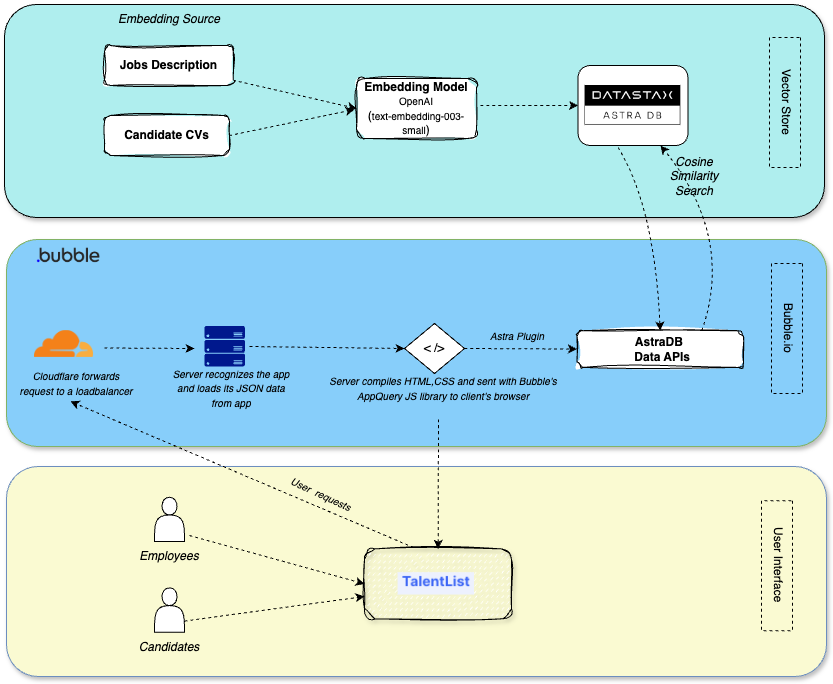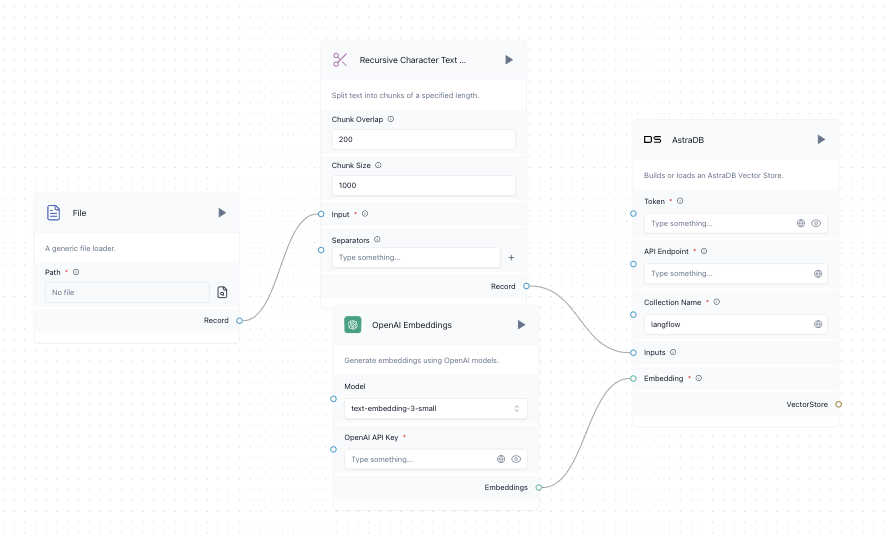In the fast-paced world of short-term staffing, time is of the essence. Employers need a reliable way to find and hire qualified candidates without delay. Traditional databases often fall short in handling this task's dynamic and high-volume nature, leading to inefficiencies and missed opportunities.
To address this, Netherlands-based TalentList uses advanced vector search technology to ensure more accurate and efficient candidate matching. The platform improves search precision by embedding candidate profiles and job descriptions into high-dimensional vectors, enabling employers to identify the best-fit candidates for their needs quickly.
TalentList connects employers with skilled candidates for short-term job vacancies. Whether hiring a waiter for a single shift or finding a barista for the weekend, TalentList improves staffing processes, ensuring businesses can quickly and efficiently find the temporary staff they need.
As a small startup, TalentList has looked to modern, no-code solutions to help simplify the development of its platform. The team turned to Bubble.io, a platform to help non-technical founders build apps without needing to learn how to code or hire an engineer. This has been a game-changer for TalentList, enabling them to focus on their core mission of connecting employers with the right talent.
TalentList has also integrated Astra DB on AWS into its platform to overcome the challenges it faced in implementing vector search. Astra DB provides the robust, scalable, high-performance database infrastructure to support TalentList's innovative staffing solutions.
Astra DB's vector search capabilities enable TalentList to implement sophisticated search algorithms, and helps the company’s solutions understand the context and nuances of job descriptions and candidate qualifications, resulting in more relevant and precise matches.

The process begins with the Embedding Source, where job descriptions and candidate CVs are fed into an OpenAI embedding model (text-embedding-003-small) to generate high-dimensional vectors.
These vectors are stored in Astra DB, enabling cosine similarity searches for matching.
The Bubble.io platform manages front-end interactions. The client’s browser requests are routed through Cloudflare to a load balancer, which directs the traffic to the appropriate server. The server recognizes the application, loads the necessary JSON data, and compiles the HTML, CSS, and JavaScript. Using Bubble’s AppQuery JS library, the server sends this compiled content back to the client’s browser. The server also interacts with the Astra DB Data API through an Astra Plugin to fetch relevant data. The user interface enables employees and candidates to interact with the TalentList application, making user requests that are processed and displayed accordingly using hybrid search.
How hybrid search works
-
Keyword-based search: This traditional method matches search queries with keywords in the database. While quick and effective for exact matches, it can miss relevant results if the keywords do not align precisely.
-
Vector-based search: This method converts text into high-dimensional vectors, capturing its semantic meaning and context. This approach allows for more flexible and accurate matches even when the exact keywords are absent.
Integrating these two methods enables hybrid search to balance speed and relevance, making it especially useful in complex search scenarios where context and precision are crucial.
With CQL
Hybrid search can be performed using CQL and text analyzers, such as searching for jobs in a specific location like 'Amsterdam'. Text analyzers process text in a column for term matching, such as identifying 'developer' in various job titles like 'software developer' or 'web developer', improving the discovery of relevant information in a table.
This query retrieves job details where the location matches the specified term by combining with a vector-search:
"SELECT job_id,job_title,skills,salary,location,embedding_vector,similarity_cosine
(embedding_vector, {query_embedding}) as score FROM
{ASTRA_DB_KEYSPACE}.{ASTRA_DB_TABLE_NAME} where location: 'Amsterdam'
ORDER BY embedding_vector ANN OF {query_embedding} LIMIT 3"With Langchain and AstraPy
results = astraVectorStore.similarity_search("Could you find me a part
time barista?", 1, filter={"city": "Amsterdam"})Results
By implementing DataStax’s advanced vector search technology, TalentList automated recruitment significantly improves efficiency and accuracy by 10X. This innovative method enables the platform to match job candidates with suitable roles quickly and precisely, reducing the time and effort associated with manual searches. As a result, employers can quickly find the best talent, transforming the recruitment landscape and setting a new standard for the staffing industry.
The Data API provided by Astra DB made TalentList's journey significantly easier by enabling the seamless execution of complex queries. The API offers a simple and intuitive way to interact with the database, enabling TalentList to focus on developing its core application features without worrying about the complexities of database management. By adopting Astra DB’s Data API, TalentList could implement advanced search functionalities and efficient data retrieval processes, making their platform more dynamic and user-friendly.
What’s next?
TalentList plans to introduce a chatbot using retrieval-augmented generation (RAG) technology. Using the Langflow no-code RAG tool, this chatbot will act as an assistant to help employers find the best candidates for their needs. It will be able to answer questions about candidates' years of experience and salary expectations, making it easier for employers to narrow their searches. Using RAG technology, the chatbot will access and process a large amount of data to provide accurate and relevant recommendations. This new chatbot will change how employers approach staffing, making the process faster and more straightforward.
LLM feedback and review systems
TalentList wants to transform its recruitment process by implementing a feedback and review system powered by large language models (LLMs). This innovative system will enable employers to provide detailed reviews for hired candidates, dynamically adjusting the weighting of each candidate in the recommendation algorithm. Candidates receiving positive reviews will have higher weights, improving their chances of being recommended for future roles.
By integrating LLM intelligence, TalentList wants to combine real-world feedback with advanced AI-driven assessments, ensuring an accurate and efficient recruitment process.
Conclusion
TalentList has revolutionized the short-term staffing industry by integrating Astra DB into its platform. The powerful combination of advanced search capabilities, scalability, reliability, and hybrid search integration ensures that TalentList can meet the dynamic needs of employers and candidates alike.
Get started building on Astra DB for free and accelerate your adoption to AI with Langflow.





